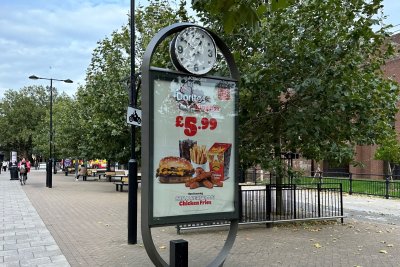 Newcastle upon Tyne. Credit: Wikimedia Commons
Newcastle upon Tyne. Credit: Wikimedia Commons
The newly elected North East mayor, Kim McGuinness is prioritising children's health after committing to implement a healthier food advertising policy across the transport network. She made the commitment via her X account (formerly known as Twitter) in the days leading up to the North East’s mayoral election last week after the Independent candidate and North of Tyne mayor, Jamie Driscoll said it was a policy he would bring in if he were to be elected.
Sustain developed the healthier food advertising policy in collaboration with the Mayor of London’s team and supported them to implement across the Transport for London network in 2019. Since then a further 13 English councils have successfully signed off on these policies with Sustain’s support, and close to 150 councils (40% of the UK) are consulting with Sustain to implement their own local policy.
The healthier food advertising policy became a talking point for all six candidates after Jamie Oliver challenged them on social media. Kim McGuiness (Labour), Jamie Driscoll (Independent) and Andrew Gray (Green) indicated their support for a policy. The Conservative, Liberal Democrat and Reform UK candidates did not commit to the policy.
The healthier food advertising policy would be of particular benefit to the North East where health inequalities are increasing and it has the highest rates of children living with obesity in England. Research shows that young people growing up in more deprived areas are more exposed to unhealthy food advertising, putting them at higher risk of food related ill health, such as diabetes, heart disease and cancer. By switching the spotlight away from unhealthy food, this policy reduces that risk, helping to level up health inequalities.
Fran Bernhardt, Sustain’s Commercial Determinants Coordinator said:
'We're delighted to see the new North East Mayor make a commitment to children’s health with this well-evidenced policy.
All children deserve to be healthy no matter where they live. However, in many neighbourhoods, food companies set the stage for unhealthy food to play a starring role in children's minds, increasing their risk of food related ill health. The good news is research shows that when we switch that spotlight away from unhealthy foods, we considerably reduce food related ill health for those most at risk.
The North East joins a movement of almost 40% of the UK's local governments who are working with Sustain to implement a robust healthier food advertising policy. We will be watching closely to see that this commitment is followed through. We look forward to offering our expertise and support in the near future so that the North East can set the stage for healthier food and champion their children's health.'
Kim McGuiness, Mayor of the North East said during the campaign:
'As North East Mayor, I’ll ban junk food advertising on public transport, stations & bus stops to tackle health inequalities and child poverty.'
Background
Evidence from the London School of Hygiene and Tropical Medicine’s evaluation of the Transport for London policy has shown that the restrictions led to a 20% reduction in sugary products, and a 1000 calorie decrease per week per household from unhealthy foods and drinks. Further modelling research from the University of Sheffield has estimated that across London, the restriction will lead to 95,000 fewer cases of obesity, 3000 fewer cases of diabetes and 2000 fewer cases of heart disease and save the NHS £218 million over the lifetime of the current population.
Transport for London also announced that its advertising revenues have been unaffected by the restrictions since implementation in 2019. In the first year of the policy, revenues went up by £2.3 million, and in the second year (2020-21), despite financial losses due to Covid lockdowns at the time, the restrictions enabled the advertising figures to be maintained.
While local authorities are taking action, national government has stalled on anti-obesity measures. In 2020, The Government announced plans to restrict unhealthy food adverts, including a total online and 9pm TV watershed as a key part of the government's obesity strategy. These were due to be implemented in January 2023. However, in December 2022 the national Government delayed these to October 2025 - a delay that pushes them back three years after the date they originally committed to. This comes after the Obesity Health Alliance’s research found that 8 out of 10 adults support the Government restricting unhealthy food advertising to children on TV (79%) and online (81%).
If your local government is interested in introducing a healthier food advertising policy, check out Sustain's toolkit for local authorities.
Good Food Local: Good Food Local supports local authorities to prioritise good food and commit to action on a breadth of food issues.
Sustain
The Green House
244-254 Cambridge Heath Road
London E2 9DA
020 3559 6777
sustain@sustainweb.org
Sustain advocates food and agriculture policies and practices that enhance the health and welfare of people and animals, improve the working and living environment, promote equity and enrich society and culture.
© Sustain 2024
Registered charity (no. 1018643)
Data privacy & cookies








